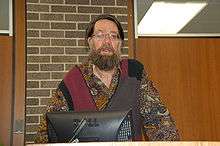Franklin Rosemont
| Franklin Rosemont | |
|---|---|
 Franklin Rosemont speaking at Loyola University, Chicago, 2007. |
Franklin Rosemont (2 October 1943 – 12 April 2009) was an American poet, artist, historian, street speaker, and co-founder of the Chicago Surrealist Group.[1] Over four decades, Franklin produced a body of work, of declarations, manifestos, poetry, collage, hidden histories, and other interventions intended to inspire a new generation of revolution, and became perhaps "the most productive scholar of labor and the left in the United States."[2]
Early life
He was born in Chicago, Illinois, to Henry, a typograher and labor activist, and Sally, a jazz musician.[3] He dropped out of high school but was admitted to Roosevelt University in Chicago in 1962, studying under African-American scholar[4] St. Clair Drake.[5]
Career
He edited and wrote an introduction for What is Surrealism?: Selected Writings of André Breton, and edited Rebel Worker, Arsenal/Surrealist Subversion, The Rise & Fall of the DIL Pickle: Jazz-Age Chicago's Wildest & Most Outrageously Creative Hobohemian Nightspot and Juice Is Stranger Than Friction: Selected Writings of T-Bone Slim. With his wife Penelope Rosemont, hersef the author and editor of several books and active in the Chicago Surrealists, and poet and storyteller Paul Garon, he edited The Forecast is Hot!. His work has been deeply concerned with both the history of surrealism (writing a forward for Max Ernst and Alchemy: A Magician in Search of Myth) and of the radical labor movement in America, for instance, writing a biography of Joe Hill. According to PoetrySoup.com Franklin Rosemont "became perhaps "the most productive scholar of labor and the left in the United States."[6]
Publications
Rosemont is the author of the poetry collections The Morning of a Machine Gun: Twenty Poems & Documents. Profusely Illustrated By the Author, The Apple of the Automatic Zebra's Eye, and Penelope: A Poem, as well as An Open Entrance to the Shut Palace of Wrong Numbers, a book that explores the phenomenon of "wrong numbers" from a surrealist perspective, which was published by Black Swan Press in 2003. He also edited and introduced Hobohemia: Emma Goldman, Lucy Parsons, Ben Reitman & other agitators & outsiders in 1920s/30s Chicago, by Frank O. Beck.[7]
Rosemont, Franklin (2002). Joe Hill. Chicago: Charles H. Kerr Publishing Company. ISBN 0-88286-265-0.
In 1990 he published a collected edition of short stories by the socialist utopian author Edward Bellamy, titled Apparitions of Things to Come. He is co-editor, with Archie Green, David Roediger, and Salvatore Salerno, of The Big Red Songbook (Chicago: Charles H. Kerr, 2007).
References
- ↑ The Surreal Life of Franklin Rosemont by Paul Garon, David Roediger and Kate Khatib, April 16, 2009
- ↑ The Surreal Life of Franklin Rosemont by Paul Garon, David Roediger and Kate Khatib, April 16, 2009
- ↑ Bio
- ↑ http://www.counterpunch.org/2009/04/16/the-surreal-life-of-franklin-rosemont/
- ↑ Ruff, Allen (2011). We Called Each Other Comrade: Charles H. Kerr & Company, Radical Publishers. Oakland: PM Press. p. x.
- ↑ https://www.poetrysoup.com/quotes/franklin_rosemont
- ↑ Beck, Frank O. (2000). Hobohemia: Emma Goldman, Lucy Parsons, Ben Reitman & other agitators & outsiders in 1920s/30s Chicago. Chicago: Charles H. Kerr.
External links
- Franklin Rosemont 1943–2009 This "cyber-tombeau" at Silliman's Blog by poet Ron Silliman includes comments, tributes, and links
- Remembering a Wobbly Surrealist an extensive tribute to Rosemont
- Franklin Rosemont, fellow worker, surrealist poet, great American comprehensive set of links to obituaries on Rosemont found around the web as of April 2009
- Franklin and Penelope Rosemont collection of IWW Publications at Newberry Library
- Franklin Rosemont at Library of Congress Authorities, with 16 catalog records